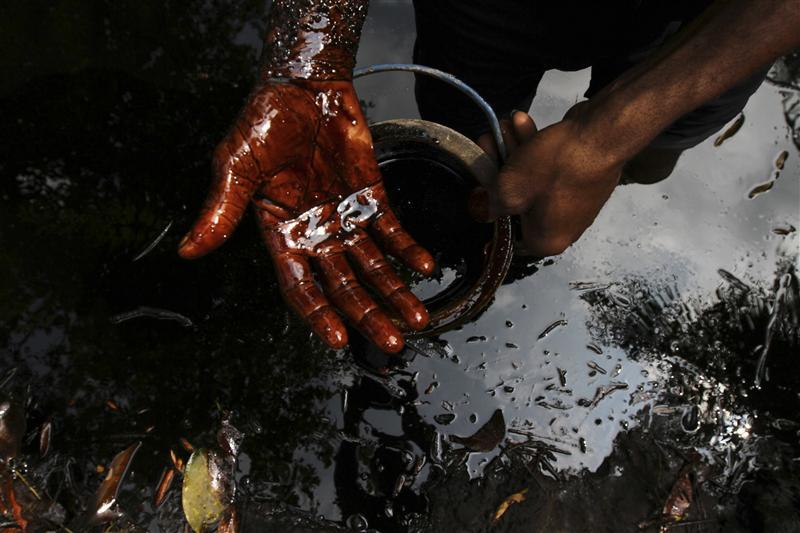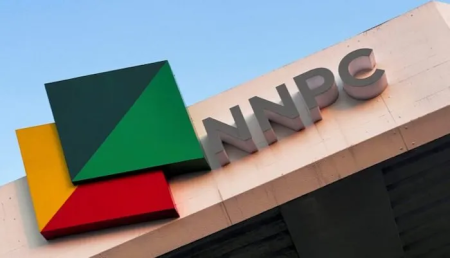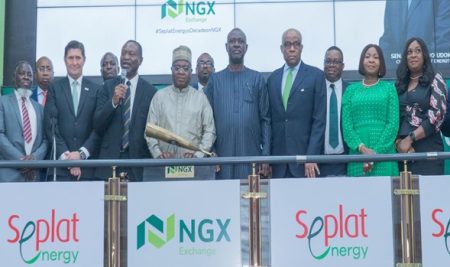
OpeOluwani Akintayo
24 March 2018, Sweetcrude, Lagos — The total occurrences of oil spills in the Niger Delta between 2011 and 2017 have been pegged at 1830.
Data obtained from Amnesty International, AI showed that a total of 1830 oil spills took place within the years reviewed.
A breakdown of the spills showed that international oil giant, Shell Petroleum Development Company, SPDC spilled the highest with 1,010 from 2011, while Eni had a total of 820 spills from 2014 till 2017.
AI said the figures do not include all those spills which occurred in the decades before the companies began publicly reporting.
“They have had an undeniably devastating impact on the lives and livelihoods of the people of the Niger Delta”, AI said in its latest report, ‘NEGLIGENCE IN THE NIGER DELTA DECODING SHELL AND ENI’S POOR RECORD ON OIL SPILLS’.
According to figures based on publicly reported Joint Investigation Visit, JIV forms, both operators have however been reporting fewer spills from their networks per year since 2014.
In its letter to Amnesty International, Eni said that the reduction in spills along its network since 2014 had been a consequence of a series of measures that it had taken, including the deployment of new technologies to prevent and detect spills as well as increased surveillance both by overflights and members of local communities.
However, Amnesty International said it had no way of verifying this information, but according to the National Oil Spill Detection And Response Agency, NOSDRA, such measures by the operators were only partly responsible for the drop in reported spills.
It assessed that the drop was also due to the impact of the so-called “amnesty programme,” which since 2009, has seen the government provide payments to certain armed militant groups in the Niger Delta in exchange for them laying down their weapons.
The militants have been blamed for many of the attacks on oil and gas pipelines in the Niger Delta.
According to AI, the number of spills only tells part of the problem.
“A more accurate guide is the reported volume of oil spilled into the environment.”
While Shell reported that from 2001, it lost 110,535 barrels or 17.5 million litres along the network of pipelines and wells that it operates, Eni reported a loss of 26,286 barrels or 4.1 million litres.
The companies have reported that these figures have also improved recently, yet, AI said these figures are only estimates.
“And as previously exposed by AI and the Centre for Environment, Human Rights and Development, CEHRD, the figures are based on a flawed methodology”.
According to the company JIV forms, the majority of spills were caused by “third party interference.” Shell reported that 189 spills from its network were “operational” (18.7% of its total).
Eni reported that 90 from its network were operational (10.98%).
The companies say that this means that the vast majority of spills and resultant pollution are not their faults.
According to Amnesty International’s analysis, these figures, as well the reported volumes of spilled oil are likely to be understatements.
The report said while oil spills have occurred over the whole network of Shell and Eni’s oil wells and pipelines, analysis of spill locations shows that time after time the same stretches of the pipeline are affected by oil theft and sabotage.
Regardless of the cause, companies are still required by Nigerian law, and in line with international industry standards, to take all reasonable measures to prevent them.
“The high number of spills and their clustering at certain hotspots over a number of years demonstrates a major failure by companies not to put in place all reasonable precautions to prevent them”.
“The fact that so many spills occur along the same stretches of pipeline means that these acts are predictable – companies can identify such hotspots and take appropriate measures to protect them, such as by stepping up surveillance patrols”.
Since 2014, Eni has reported 262 spills along its 92km-long “18” Tebidaba/Brass Pipeline”, which runs through the Southern Ijaw region of Bayelsa state.
Given that no other African country reports anywhere near this number of spills, the “18” Tebidaba/Brass Pipeline” could well be the continent’s leakiest stretch of pipeline, according to AI.
Eni blamed all but two of the spills on “third party interference”, such as criminal gangs seeking to install taps to steal oil.
It also reported that 96 of the 262 spills occurred on “previously repaired” sections of the pipe.
This means that after the company had identified and repaired a theft point, someone had later attacked exactly the same point.
In this case, access to the area was certainly not a problem for the company.
In the overwhelming majority of cases (240 times out of 262), Eni conducted JIVs on the same day that spills were reported.
“If it had such regular and fast access to the spills, it would have been reasonable to expect Eni to increase surveillance patrols in specific locations”.
Amnesty International’s analysis of JIV forms completed by NOSDRA found that the government had repeatedly raised its concern with Eni.
In fact, between 2014 and 2017, the regulator warned Eni on 162 different occasions that it needed to improve surveillance along the pipeline to prevent further spills.
In response, Eni stated that it had in fact taken measures to prevent attacks on this pipeline, and provided information that after 2014 it increased the frequency of aerial and ground surveillance.
Eni reported that these have measures worked – pointing to the fact that in 2017, Eni said only four spills along the 18” Tebidaba/Brass Pipeline, compared to 162 in 2014.
“It is not possible to verify this claim, and Eni did not explain why the company did not put in place such measures prior to 2014”.
“The companies must take similar action to address attacks on other “spill hotspots”. For example, Shell reported 62 spills, mostly caused by “sabotage” or “theft” from its “Imo River – Ogale 1 and 2” pipelines between 2011-17. It is notable that many spills occurred close to roads and were not far from Port Harcourt (i.e. were not remote)”.
Government regulations require that the companies report a spill within 24 hours of it taking place, and then conduct a JIV 24 hours after that.
Separate guidelines state that the clean-up of an oil spill should commence within 24 hours of it starting.
Companies can face financial penalties for breaching these regulations.
Analysis of the time between the companies reporting a spill and conducting a JIV reveals that there is often a much bigger time lag.
“This matters because the companies frequently do not stop the leaks until during or after the JIV”.
“Also, following industry practice in Nigeria, the companies do not start the clean up until after the JIV, which means that pools of spilled oil are left untouched for long periods of time, which can result in the oil spreading”.
According to Amnesty, delays are not just a breach of Nigerian law but also result in worse contamination.
“It is notable that of the two, Shell is considerably slower than Eni. Even though the number of spills Shell has reported is reducing, the data shows that its response to spills has become slower over time, although there was an improvement in 2017”.
Analysis showed that overall, Shell reported holding JIVs within 24 hours of reporting a spill in only 25.7% of cases.
“This is highly irresponsible as Shell is fully aware that the longer it takes to respond, the higher the likelihood that the spill runs off in the environment and causes and contributes to further negative impacts on the right to water, health, and livelihoods”.
By contrast, analysis of the report showed that Eni responded on average much faster, holding JIVs within 24 hours of reporting on 76% of occasions.
On 13.6% of occasions (138), it actually took Shell 10 days or more to do a JIV.
On 3% of occasions, (26) Eni took 10 days or more to respond.
To mitigate the impact of delays, Shell and Eni both state that they usually shut off the flow of oil as soon as spills are reported.
“It is most unlikely that a release would be remotely detected and shutting in by the facility operator. Depending on various factors (such as pipe diameter and elevation profile, etc) oil will continue to flow for some time even when the lines have been shut down and blocked in when a field call in is made (the operator may choose to not shut down until field confirmed that a release is occurring). Wellheads are a different matter depending on their design”.
In a note to SweetcrudeReports, a spokesperson for SPDC debunked the allegations.
“The allegations leveled by Amnesty International are false, without merit and fail to recognise the complex environment in which the company operates where security, a sole prerogative of Government, remains a major concern with persisting incidents of criminality, kidnapping, vandalism, threats from self-described militant groups”.
“As an operator of a joint venture, where the government-owned Nigerian National Petroleum Corporation has a majority interest, SPDC continues to work with federal and state government agencies, communities and civil society to create a safe operating environment”.
As against allegation by AI that SPDC does not respond to cases of oil spills on time, the IOC says its responses are as “quickly” as possible.
“SPDC, in collaboration with government regulators, responds to spill incidents as quickly as it can and cleans up spills from its facilities regardless of the cause. We regularly test our emergency spill response procedures and capability to ensure staff and contractors can respond rapidly to an incident. However, response to spills, clean-up, and remediation depend on access to the spill site and ultimately on the security of personnel and equipment while work is ongoing”.
“SPDC reiterates its commitment to carrying out operations in line with best practice in a responsible and environment-friendly manner.”
SPDC’s oil spill data section on its website had blamed the spills on oil theft and sabotage of facilities, as well as illegal refining cause an environmental damage from oil and gas operations in the Niger Delta.
According to SPDC, a key priority for the company is to achieve the goal of no spills from its operations.
“No spill is acceptable and we work hard to prevent them”.
However, Shell said regrettably, in addition to spills caused by criminal activity, there were seven operational spills of more than 100 kg in volume from Shell Companies in Nigeria facilities during 2016.
This number, the company said is less than the 16 spills in 2015, due to continued progress on preventing operational spills, such as regular inspections and maintenance of pipelines
“SPDC has publicly reported oil spill statistics annually since 1995 in the Shell sustainability report and this website further enhances transparency on spills in Nigeria from SPDC-JV facilities. It tracks the progress of our spill response from when we learn about the leak to when clean-up is completed and certified by Regulators”.
In conclusion, AI’s data showed that there has been a staggering number of reported spills since the two companies started publishing their JIVs in 2011 and 2014 respectively.
The data also showed that many of these spills are clustered along the same stretches of the pipeline.
“The oil companies blame most of these on oil thieves and sabotage. Even if all these reports are accurate, there is evidence that the companies are failing to do all they can to prevent them, as they should in line with international best practice and Nigerian law”.
“The UN Guiding Principles make clear that companies have an independent responsibility to respect human rights. This requires taking preventative steps to avoid human rights abuses from arising in their operations”.
According to the report, there are a series of measures that Shell and Eni should implement to prevent both operational oil spills and those caused by oil theft and sabotage.
These include measures to protect the pipelines by burying them deeper, encasing them in thicker concrete, improving leak detection systems, intensifying surveillance and ensuring more rigorous and more frequent inspections.
“Eni has provided detail of how it is putting in place such systems, and claimed that they have succeeded in preventing attacks on its pipeline network”.
“By contrast to Eni, Shell provided no information on the steps it is taking to prevent attacks, but has previously reported that increased surveillance and new technology had prevented attacks”.
“It is not possible for Amnesty International to verify these claims. Neither company publishes their plans to prevent spills, or other relevant information, such as details of the condition of their pipelines and other assets, and the age of infrastructure”.
“While both companies have recently reported drops in the number of spills, there have been hundreds spills on average every year from their pipelines for several decades, raising the question of why they did not act sooner”.



